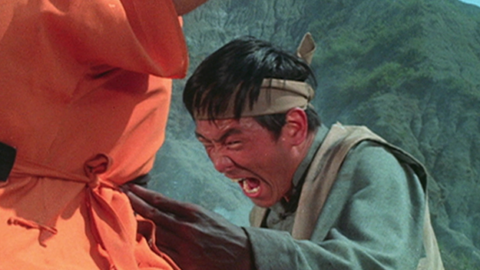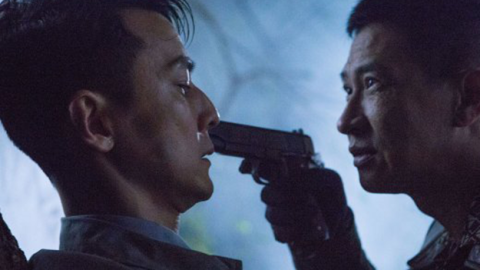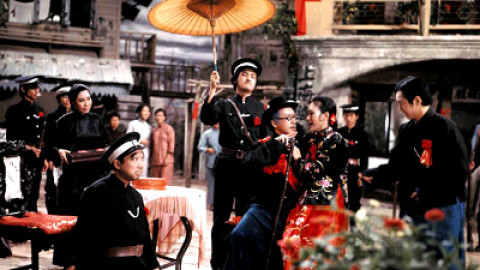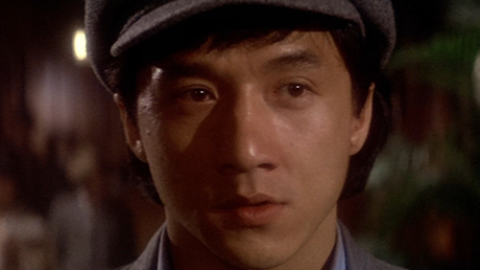Kaiju Shakedown: Ip Man 3
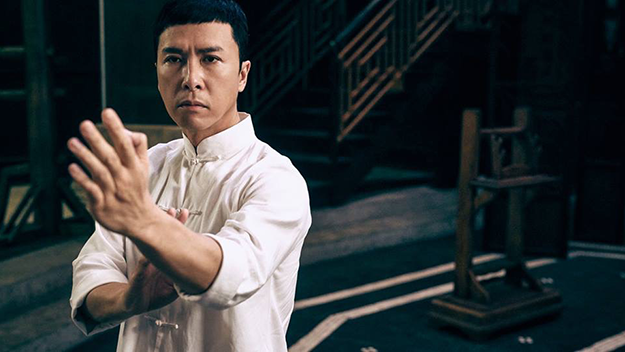
Ip Man 3
Ip Man 3 hits theaters this Friday, starring Donnie Yen and a CGI moth. The third installment in the series that made Hong Kong kung fu movies box-office hits again brings back Ip Man—that mild-mannered slouch-shouldered paragon of Confucian virtue whose big claim to fame is that he taught Bruce Lee the art of wing chun. As big-budget entertainment goes, the Ip Man movies are bulletproof. Donnie Yen may be in his early fifties but Ip Man is the first iconic role he’s ever played and he wears him well. This time around, the series adds Mike Tyson playing himself and Danny Chan (the goalie in Shaolin Soccer) impersonating Bruce Lee, and it’s replaced Sammo Hung on action choreography with Yuen Wo-ping (The Matrix, Crouching Tiger, Hidden Dragon). If you can’t have a good time at a movie featuring Mike Tyson speaking Cantonese, a Bruce Lee look-alike, and a bunch of Yuen Wo-ping fight scenes, then you probably can’t have fun.
The real-life Ip Man was a cop in China who moved to Hong Kong after the Communists came to power (Ip was a Nationalist, the guys who lost the civil war against Mao) and got a job as a wing chun teacher. Already in his fifties, he’d studied wing chun in China, and became famous for it in Hong Kong, eventually taking on a teenage Bruce Lee as his student. Ip died in 1972, and things were quiet until 2008 when the Raymond Wong-produced, Donnie Yen-starring Ip Man became a big hit and launched an Ip Man industry: two sequels, two unrelated Ip Man movies, Wong Kar Wai’s movie The Grandmaster, and a TV series.
Why so much Ip Man? Partly because the holy grail of Hong Kong cinema has always been a Bruce Lee biopic. It’s easy to underestimate the power of Bruce Lee, but the man was a massive icon and Hong Kongers who were alive in 1972 all remember where they were when he died. However, the Lee estate controls his image with an iron fist (they sued Ip Man 3 when they heard a CGI Bruce would appear). So if you can’t make a Bruce Lee biopic, then making one about his teacher is the next best thing.
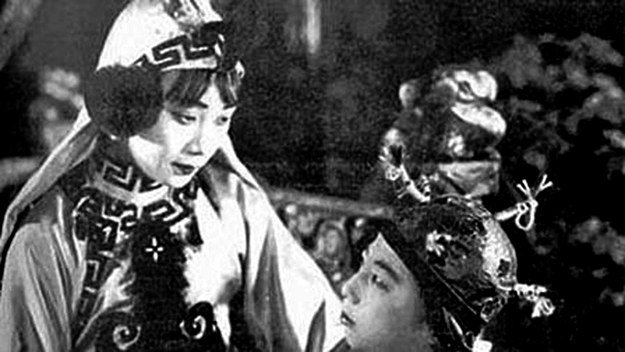
Burning of the Red Lotus Temple
This means that Donnie Yen has joined a line of cinematic kung fu champions that stretches back to the 1940s, starting with Kwan Tak-hing, then Jimmy Wong Yu, then Jet Li, and now Donnie Yen. Hong Kong martial-arts movies can be divided roughly into two categories: wu xia and kung fu. Wu xia comes out of a school of literature about wandering warriors and martial-arts heroes that’s existed since around 90 B.C. Set in the jiang hu (literally “rivers and lakes”), a storied realm akin to the mythologized American Wild West, these tales feature footloose monks, swordsmen, scholars, bandits, bodyguards, burglars, and beggars crossing paths, governed by strict, unwritten codes of behavior. Swordsmen in wu xia are so powerful that they can shoot their swords like guided missiles, kill with a laugh, or fire blasts of palm power, all fueled by their highly-developed internal chi. The first wu xia movie was 1928’s Burning of the Red Lotus Temple, and it was full of booby-trapped underground mazes, hidden fortresses, funky weapons, and bizarre martial arts.
Kung fu movies are supposedly more realistic. Their roots lie in what are sometimes called “combat novels” which started appearing around 1915. These were far more grounded accounts of martial artists, often fictionalizing the exploits of actual fighters. Their goal wasn’t to blow your mind with wack-a-doodle Thunder Palms but to pay tribute to the kinda-sorta-real-life martial-arts masters who lived in China and preserved its traditions. These novels mostly featured characters descended from the martial-arts monks of the Shaolin temple, like the real-life Wong Fei-hung (Jet Li plays him in the Once Upon a Time in China series), Huo Yuanjia (Jet Li plays him in Fearless), and the fictitious Fong Sai-yuk (once again, Jet Li, in Fong Sai-yuk).
Huo was a big deal in serialized novels in the 1920s and ’30s, patriotically putting the pain on foreign fighters, but Fong actually arrived first on film, with Fang Shiyu Takes a Challenge (28) followed by The Adventures of Fong Sai-Yuk (38). Stories of this young, brash, fight-happy fist-slinger became a big craze during World War II, paving the way for Wong Fei-hung, whose first film piggybacked on Fong’s success. The real-life Wong, who died in 1924, is sober and stoic, a physician who became a folk hero. Rejecting Fong’s youthful punch-drunk ways, Wong on screen was a tower of virtue known for being hard on himself but tolerant of others. He rejected Huo’s nationalist passions, instead choosing to battle Chinese thugs, help the poor, lecture the rich, and avoid fights rather than seek them out.
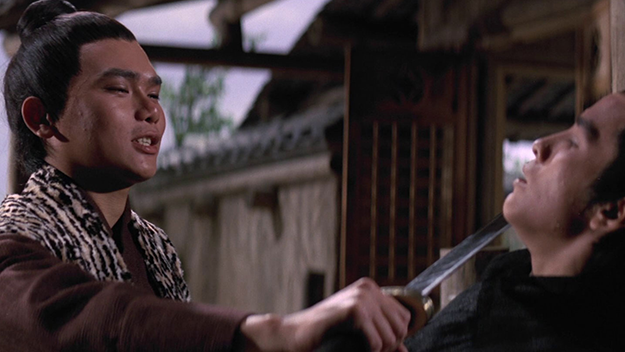
The One-Armed Swordsman
What’s weird about kung fu movies is that, unlike wu xia, real actors have become almost interchangeable with their fictionalized counterparts. Actor Kwan Tak-hing embodied Wong in a 77-film series. He was so closely identified with the role that he refused to ask for a raise because WWWFHD (What Would Wong Fei-hung Do?) and so when the series ended in 1970 he was still making the same salary he made when it started in 1949: $520 per film. Shot in Hong Kong, the Wong Fei-hung movies were a training ground for a legion of martial-arts moviemakers like Lau Kar-leung (his teacher was only two steps removed from Wong Fei-hung himself) and Simon Yuen (whose sons would include Yuen Wo-ping).
By the late Sixties, kung fu was dead. Wong Fei-hung movies were moralistic lectures, and the occasional Fong Sai-yuk flick didn’t offer a lot to audiences going through some series Sixties changes. Not to worry. After Jimmy Wong Yu and director Chang Cheh (along with action choreographers Lau Kar-leung and his partner Tong Kai) rejuvenated the wu xia movie with The One-Armed Swordsman (67), Jimmy Wong Yu took on kung fu next. Putting Wong Yu’s angry-young-man persona front and center, 1970’s The Chinese Boxer makes his character one part Huo and one part Fong, but no parts Wong Fei-hung. The ur kung fu movie text for the next 40 years, Chinese Boxer (which Wong Yu directed himself) sees evil Japanese kill his master, allowing him to kill thousands of evil Japanese.
The following year, Bruce Lee brought his animalistic charisma to The Big Boss (71) and kung fu films were officially young and pissed-off. The new heroes had rippling muscles and short tempers, dishing out family-sized portions of pain to foreign devils like the Thais (The Big Boss), the Italians (Way of the Dragon), and the Japanese (Fists of Fury, in which Bruce played Chen Zhen, one of Huo Yuanjia’s students). Next, a wave of Shaolin martial-arts films flooded out of Shaw Brothers studios in the early Seventies—Shaolin Martial Arts (74), Five Shaolin Masters (74), Disciples of Shaolin (75), The Shaolin Avengers (76), The New Shaolin Boxers (76)—inspiring a secondary surge of knock-off independent productions.
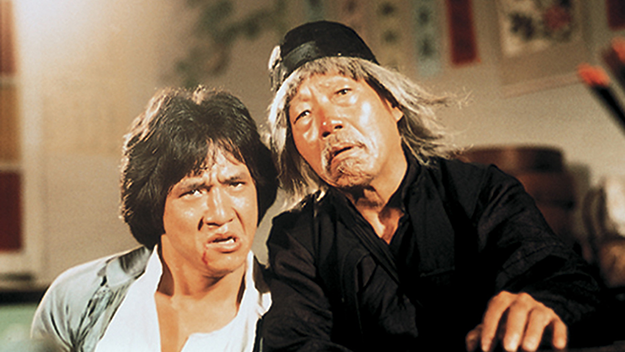
Drunken Master
Anger burns bright, but not for very long, and Lau Kar-leung revived the Wong Fei-hung genre by making Wong a young, but not-so-angry man in Challenge of the Masters (76) and a few years later Yuen Wo-ping made Jackie Chan a star as a young, dumb Wong Fei-hung in Drunken Master (78), replacing the angry young man with the brash and endearing young man. The Eighties were dominated by the heroic bloodshed films of John Woo and the contemporary kung fu comedies of Sammo Hung and Jackie Chan, as audiences became less concerned with who your master was or what kind of Southern Fist you practiced than with motorcycles smashing through shopping malls and people roller-skating underneath speeding 18-wheelers.
Bruce Lee, Jimmy Wong Yu, and Kwan Tak-hing have become almost as important in the annals of kung fu as the characters they portrayed on screen, and so the press (and Chinese audiences) were shocked in 1991 when Tsui Hark cast Jet Li, a divorced actor with a DOA career then living in San Francisco, as that tower of Chinese virtue, Wong Fei-hung. Once Upon a Time in China launched a franchise, made Li a star, and revived the kung fu movie for the Nineties, kicking off a string of Wong Fei-hung, Fong Sai-yuk, and Chen Zhen movies, most of them starring Jet Li, with occasional appearances by Zhao Wen-zhuo, Jackie Chan, and Chin Kar-lok.
Despite a big-budget Huo Yuanjia film in 2006 (Fearless, starring Jet Li) there wasn’t much kung fu in the 2000s, in part because it was an old-fashioned genre, but mostly because no one could afford Jet Li anymore and there weren’t any other actors around to replace him. Yuen Wo-ping had tried to turn Donnie Yen into a star for decades, but despite appearing as a break-dancing kung fu cop (Mismatched Couples, 85) and a suit-wearing high-kicking cop (Tiger Cage, 88), he was mostly known as a bad guy or a second-stringer, fighting Jet Li’s Wong Fei-hung (Once Upon a Time in China 2, 92), playing Wong Fei-hung’s father (Iron Monkey, 93), or fighting Jet Li (Hero, 02). It wasn’t until Wilson Yip’s contemporary cop flick, SPL (05) that Donnie Yen became a star. His portrayal of Ip Man with stooped shoulders, a protruding neck, and a milquetoast manner made him the last kung fu icon standing at the age of 45.
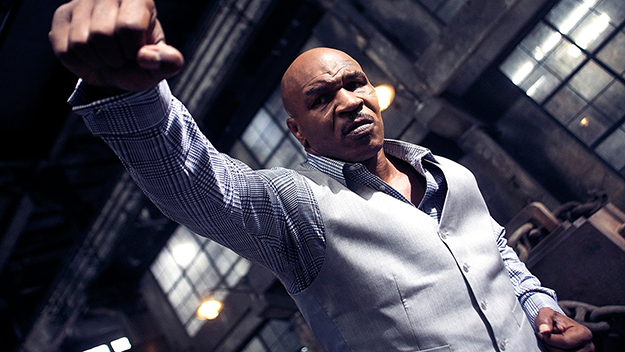
Ip Man 3
The latest Ip Man movie is a high-pressure stream of cameos and callbacks to the history of kung fu films. The two strands of the kung fu folk hero—the wise tower of virtue, and the brash young man—are split between Donnie Yen’s Ip Man as the model of Wong Fei-hung-esque restraint, and Cheung Tin-chi, as an angry Jimmy Wong Yu-style rickshaw driver out to make a name for himself with his fists (Cheung is played by Mainland star Zhang Jin, who also played an adversary of Ip’s in Wong Kar Wai’s The Grandmaster). Ip battles a series of foreign fighters in a shout-out to Huo Yuanjia’s nationalist kung fu, and the presence of Mike Tyson is a callback to Bruce Lee’s battle with Kareem Abdul-Jabbar in Game of Death (78).
The presence of Bruce Lee in Ip Man 3 represents a missed opportunity. The original plan was to use a CGI Bruce, but Bruce Lee Enterprises (whose CEO is Lee’s daughter, Shannon Lee) threatened to sue. Conventional wisdom has always held that BLE only owns the rights to Lee’s image once he became a movie star, and that depicting him as a pre-Green Hornet private citizen (which this movie, taking place in 1959, does) was fair game. The suit was resolved, apparently by replacing CGI Bruce Lee with BLE-approved actor Danny Chan, who starred in a 2008 Bruce Lee TV series in China which was produced by Shannon Lee.
Whatever happened behind the scenes, the result is an on-screen nod to Lee, not a real appearance, which is sad because the actual story is fascinating. Lee was a brawling street fighter in Hong Kong when he was a teenager, but he fell under the influence of the elderly Ip Man’s wing chun classes and acquired the discipline he craved. Ip became something of a father figure to Lee, which was fortunate since his relationship with his own father, a Chinese opera star, was tense. But around 1959, Ip Man’s other students got sick of Lee. Whether they were jealous of his abilities, their teacher’s affection for the kid, or his competitive grandstanding, they struck at Ip Man’s weak point.
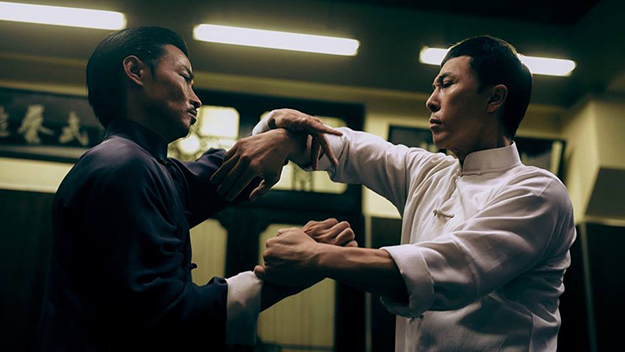
Ip Man 3
By that time, Ip was in his mid-sixties, married to a second wife whom his students resented and disrespected because they thought she was too low-class for their teacher. In addition, she had cancer that would kill her within the year. Ip, by some accounts, was smoking opium to escape from the stress of life, and money was always a worry. In the middle of this tension, his students came to him and demanded that he stop teaching Bruce Lee because Lee’s maternal grandmother was a Westerner. By some reports, a flustered Ip Man retreated into silence. When Lee arrived at class that day, the senior students refused to spar, and one told him that he was no longer welcome because of his foreign blood. Lee supposedly confronted Ip Man and asked him if he was still his student. Unable to say yes, and unwilling to say no, Ip Man maintained his silence. And so Lee walked out of his class. Lee was sent to America shortly thereafter, rejected by both his real father and the teacher who had been his father figure. No one even came to the dock to say goodbye.
As with Wong Fei-hung and Huo Yuanjia, it’s hard to know how true this story is. Ip Man’s many students, and Bruce Lee’s many associates, are protective of their stories, and they present conflicting accounts designed to promote one agenda or another, or maybe just because they have different memories. There are many keepers of the flame, and many of them are pursuing conflicting interests (Bruce Lee’s brother, Robert, was paid by Ip Man 3 as an advisor). But maybe that’s a sign of having reached the status of a kung fu folk hero. The reality doesn’t matter anymore, only the legend.
LINKS! LINKS! LINKS!
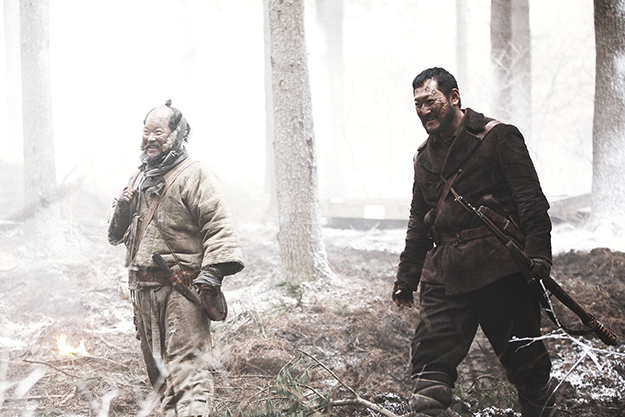
The Tiger: An Old Hunter’s Tale
… The movies we’ve been waiting for are coming and big directors are starting to release their 2016 projects. First up is The Tiger: An Old Hunter’s Tale. Marking the reunion between director Park (The New World, 13) and star Choi Min-Shik (The Admiral: Roaring Currents, 14) the movie tells the story of a killer tiger hunted in Japanese-Occupied Korea. The Hollywood Reporter says that “the film doesn’t offer the unbridled nationalism in recent Korean blockbusters,” and calls the tiger “impressive.” Choi does not play the tiger. Probably.
… Q, the Indian bad boy director whose rough’n’ready Gandu (10) was one of the most impressive debuts to come along in many years, is at Sundance this month with Brahman Naman. An English-language movie set in the 1980s about a gang of kids competing in a National Quiz Competition (and trying to lose their virginity) is definitely a change of pace from his last movie, Tasher Desh (12), a bratty and willfully obscure adaptation of a Tagore play. Q still hasn’t delivered on the promise of Gandu, but here’s hoping that Brahman Naman is all that it should be and in spades. And if Q’s in charge, at least it won’t be boring.
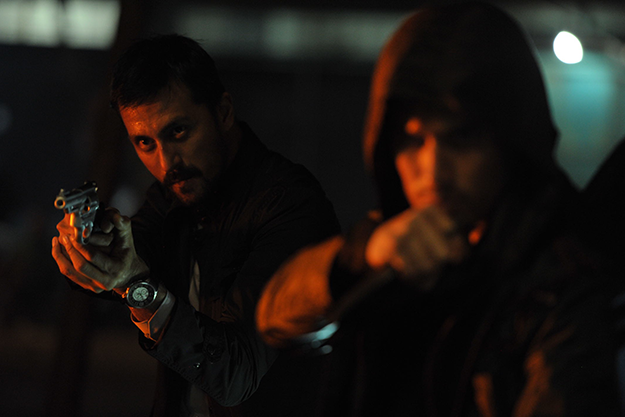
Halfworlds
… HBO Asia’s biggest project yet is Halfworlds, a kind of predictable-sounding eight-part series about demons co-existing with humans in modern-day Jakarta. What makes it interesting is that it’s directed by Joko Anwar, probably Indonesia’s most talented director and a man whose movies like Kala (07), The Forbidden Door (09), and A Copy of My Mind (15) have been tearing up the film festival circuit for the past decade. Now HBO Asia has released the first couple of episodes for review and Wisekwai is all over it.
… China and Korea seem to be locked in a co-dependent relationship, swapping talent, releasing films in each other’s territories, and excreting a series of co-productions with mixed results. The latest of these is Fatal Countdown: Reset and one can only hope they change the title. This time-travel action movie is the most expensive Chinese-Korean co-production yet, with Jackie Chan in a supervisory executive producer role. Also on board are star Yang Mi (Tiny Times), cinematographer Choi Chan-Min (Kundo: Age of the Rampant), and Korean super-editor Kim Sang-Bum (who has cut almost every single awesome Korean movie, from JSA to The Man From Nowhere).
… I missed this one when it was making the rounds at the end of last year, but who doesn’t want to see a documentary about an underground wrestling circuit in Japan for disabled competitors? Welcome to Doglegs, the movie that perplexes The Hollywood Reporter. They don’t seem to like it, but they can’t turn away.
… Sammo Hung returns to direct his first big movie since 1997’s Once Upon a Time in China and America. The Bodyguard sounds like a remake of Korea’s The Man From Nowhere. Hung himself stars as a retired badass bodyguard who gets pulled back in when the daughter of a criminal goes missing. Unofficial remake or not, the trailer is pretty awesome.
… Hong Kong actor Michael Tse just drank his pee. A familiar face going all the way back to Tsui Hark’s The Blade (95) (in which he plays Skeleton), the Young and Dangerous series, and Ringo Lam’s Wild City, Tse recently participated in the Mainland Chinese version of Fear Factor, Survivor Games. On the show, he was led into a cave and given his own urine to drink, which he gulped down, according to the press, “like drinking beer!” Tse says of his ordeal: “The taste was really bad. Maybe because I know it’s my own stuff, so there was nothing uncomfortable about it.”
Grady Hendrix is a novelist and one of the founders of the New York Asian Film Festival. He writes on Asian film for Variety, Sight & Sound, and more.



